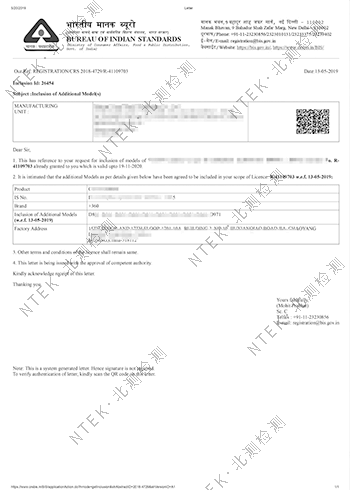Introduction of BIS certification in India
BIS certification is an Indian product certification, which is being uploaded ... supervised by the Indian Bureau of Standards (BIS). According to different types of products, BIS certification is divided into three types, including mandatory ISI mark certification, CRS certification, and voluntary certification. The BIS certification system has a history of more than 50 years and covers more than 1,000 products. All products listed in the mandatory list must obtain BIS certification (ISI logo registration certification) before they can be sold in India.
BIS is a third-party certification body. Products that pass its certification will be labeled with the ISI. This label has a large impact in India and surrounding countries. It has a good reputation and is a reliable guarantee for product quality. Once the product is marked with the "ISI mark", it means that it meets relevant Indian standards and consumers can buy with confidence.
In order to unify product regulatory standards and requirements to ensure product quality and safety, India began to implement a product certification system in 1955. According to the Indian Bureau of Standards Act 1986 (The BIS Act, 1986), India ’s product certification adopts the principle of voluntary certification, but taking into account factors such as public health and safety, and public consumption, the Indian government has issued instant laws to implement specific products Compulsory certification. Designed to provide end-users with quality-assured, safe and reliable products. All products listed in the compulsory certification must obtain a product certification certificate according to Indian product standards in order to enter the market. Therefore, manufacturers who want to enter the Indian market need to understand the Indian product certification system.
About the Indian Bureau of Standards (BIS)
According to the Indian Bureau of Standards Act 1986 (BIS Act, 1986), the Indian Bureau of Standards (BIS) is the standardization and certification authority in India. It is responsible for product certification. It is also the only product certification agency in India. Years to replace the Indian Standards Institute, established in 1946.
The Indian Bureau of Standards (BIS) is affiliated with the Ministry of Consumer Affairs and Public Distribution. Although it is a social corporation, it exercises government functions. Its main tasks are to formulate and implement national standards; implement conformity assessment systems; and participate in ISO, IEC, and other international representation Standardization activities. The Indian Bureau of Standards (BIS) is a financially independent organization with certification revenue as its main economic source. BIS has 5 regional bureaus and 19 branch bureaus. The regional bureau supervises the corresponding branch bureau. BIS's 8 laboratories and some independent laboratories are responsible for the inspection of samples taken during the product certification process. These laboratories are implemented in accordance with ISO / IEC17025: 1999.
Certification considerations
1. BIS certification is valid for one year, and applicants must pay an annual fee. You can apply for extension before the expiration, at which time you need to submit an extension application and pay the application fee and annual fee.
2. BIS accepts CB reports issued by valid agencies.
3. Certification will be faster if the applicant meets the following conditions.
a. Fill in the factory address in the application form
b. The factory has test equipment that meets relevant Indian standards
c. The product officially meets the requirements of relevant Indian standards
Certification classification
There are currently three types of BIS certification:
1. Compulsory ISI mark type certification (product testing + initial factory inspection + supervision after certification), mainly including cement, food, automotive parts, steel products and other categories;
2. BIS Compulsory Registration System (CRS) (product testing + supervision after certification), mainly including tablet computers, microwave ovens, wireless keyboards, printer power adapters, LED lights, lithium batteries, mobile power, mobile phones and smart card readers Uninterruptible power supply / inverter of ≤10kVA, rear projection / LCD / LED TV of 32 inches and below;
3. The rest are voluntary BIS certifications, and products other than compulsory mark certifications and registration certifications can apply.
Applicable product range
BIS has issued more than 30,000 product certification certificates. After obtaining the certificate, manufacturers are allowed to attach ISI labels. The certification scope covers almost every industrial field such as agricultural products, textiles, and electronics.
Compulsory certification product list:
First batch (MANDATORY)
BIS certification is applicable to manufacturers in any country. The main certification areas are:
1. Tires; 2. Electric appliances such as irons, kettles, electric stoves, heaters; 3. Cement and concrete; 4. Circuit breakers; 5. Steel; 6. Electric energy meters; 7. Auto parts; 8. Food and milk powder 9. Baby bottle; 10. Tungsten filament lamp; 11. Oil pressure furnace; 12. Large transformer; 13. Plug; 14. Medium and high voltage wire and cable; 15. Self-ballasted bulb. (Mandatory since 1986)
Second batch (COMPULSORY)
There are mandatory registration products for electronic information technology equipment, including:
1. Set-top box; 2. Portable computer; 3. Notebook; 4. Tablet computer; 5. Monitor with screen size of 32 inches and above; 6. Video monitor; 7. Printer, plotter, scanner; 8. Wireless keyboard 9. Telephone answering machine; 10. Automatic data processor; 11. Microwave oven; 12. Projector; 13. Electronic clock with grid power; 14. Power amplifier; 15. Electronic music system (from March 2013 Mandatory)
The second batch of new (COMPULSORY)
16. IT equipment power adapter; 17. AV equipment power adapter; 18. UPS (Uninterruptible Power Supply); 19. DC or AC LED module; 20. Battery; 21. Self-ballasted LED lamp; 22. LED lamp; 23 Mobile phones; 24. Cash registers; 25. Sales terminal equipment; 26. Copiers; 27. Smart card readers; 28. Postal processing machines and automatic stamping machines; 29. Pass readers; 30. Mobile power. (Mandatory from November 2014)
application process
1. Customers provide information and samples to testing institutions
2.The inspection agency conducts structural inspection of the product and prepares relevant documents for certification application?
3.The testing agency sends the sample to the Indian cooperative laboratory?
4.Sample test
5. Indian cooperation laboratory issues BIS test report
6. The inspection agency provides registration documents, Indian representatives and test reports to apply for registration with BIS
7.BIS approves and issues a registration authorization letter?
8. The customer obtains the BIS registration number of the product, and follows up with the registration and evidence collection.
Application materials
1.Application form;
2. A certificate of appointment of a local agent in India, or a document certifying the manufacturer's Indian office, and a license from the Reserve Bank of India;
3. Documents certifying the establishment of the company, such as a registration certificate;
4. Process flow chart, explaining the entire process of product manufacturing (from raw materials to finished products);
5.Quality control system (such as quality manual, quality control plan, test arrangement, etc.);
6, if available, provide other detailed information on product or system certification;
7. If available, provide detailed information on the components or raw materials used for product manufacturing before certification;
8.A list of machines manufactured;
9.List of test equipment during the test;
10.Product design drawing;
11. Details of qualifications and experience of laboratory supervisors, technical and QC staff;
12.Test report from an accredited independent laboratory or the factory's own laboratory;
13. The layout of the factory building clearly shows the main production machines, laboratories, etc .;
14. The traffic map near the factory, the map from the nearest airport or train station to the factory, and the detailed instructions from India to the factory;
15. Bill of exchange
Certificate information
 Hot Line
400-800-6106
Hot Line
400-800-6106
